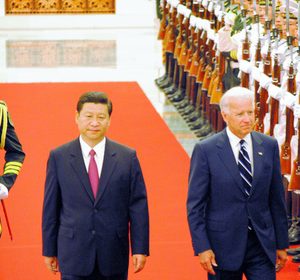Former Vice President Joe Biden ( Democratic Party), who secured the election in the US presidential election, held the first telephone talks with Prime Minister Yoshihide Suga of Japan on the 12th November, and on the same day a video conference between Japan and the leaders of the Association of Southeast Asian Nations (ASEAN) countries was opened. Following the annual ASEAN Summit, Japan, China, and South Korea hold individual meetings with ASEAN Summits in November every year under the name of "ASEAN + 3". In recent years India has also joined. There is no doubt that the US side has set its sights on this move and launched a telephone offensive.

[Photo] Mr. Biden visited China as Vice President of the Obama administration (August 2011)
At the meeting, Mr. Biden stated, following President Obama's remarks in 2014, "Article 5 of the Japan-US Security Treaty, which stipulates the US defense obligations to Japan, applies to the disputed Senkaku Islands in Okinawa Prefecture and." Even though he was the Vice President of the Obama administration, such references before Mr. Biden's inauguration are more unprecedented than unusual. Naturally, the Chinese side rebelled against this. On the same day, Prime Minister Suga, who showed a welcoming attitude, immediately returned to ASEAN leaders the cooperation under the "Free and Open Indo-Pacific" concept, with China in mind, which is strengthening its marine expansion in the South China Sea and East China Sea. This is a call for participation in the siege network between Japan, the United States and Australia, called the quad.
ASEAN countries are confused by this call. Due to the influence of the US-China trade war, both China and ASEAN have become the largest trading partners, and the direct investment to ASEAN by Chinese companies is also showing remarkable growth. China's presence in the economic field has surpassed that of the United States, Japan and Europe. It is not possible to separate "security is the United States and economy is China". Japanese government officials who were urged by the United States to make Prime Minister Kan's first overseas destination ASEAN should be similarly confused.
Meanwhile, pro-US Singapore Prime Minister Lee Hsien Loong wrote in the foreign affairs magazine Foreign Affairs in June this year , saying , "China has become a military power, but the United States is currently playing a security role in Southeast Asia. … It cannot be taken over in the future. " He defended the United States as the reason, "because subtle issues such as the fact that China is vying for sovereignty with several Southeast Asian countries in the South China Sea constrain China's role." However, even this Prime Minister Lee has been confused in recent years that "the time has come to choose between the United States and China." Now, the consensus of ASEAN is said to be "Don't ask which one to choose."
Prime Minister Kan told ASEAN leaders, "We will continue to train 1,000 railway and road engineers in Southeast Asia over the next three years and continue to support ongoing infrastructure development projects totaling 2 trillion yen." Despite that, it cannot reach China's economic offensive against ASEAN.
Former Prime Minister Abe was urged by the Obama administration to visit ASEAN before his visit to the United States in early 2013. After that, he visited all 10 ASEAN member countries within a year. It is still fresh in my memory that Vice President Byden (then), who was waiting for Mr. Abe in Singapore, placed orders for this and that during his visit .
"I will protect the Senkaku, so I will draw as many ASEAN countries into the quad as possible." This is the true intention of the new US administration.
If he takes pride in his "diplomatic Biden" and becomes the new president of the United States, it will inevitably demand an unprecedented burden on the Japanese government's ASEAN diplomacy. Furthermore, it is inevitable that the new administration will demand a series of demands from Japan, such as doubling defense costs (more than 2% of GDP), increasing the cost of stationing the U.S. military, which currently bears about 80%, and deploying ballistic missiles for China in Japan. ..
The lip service that "Senkaku is subject to Article 5 of the Japan-US Security Treaty" is infinitely large.
